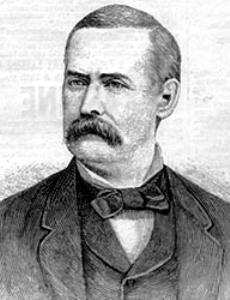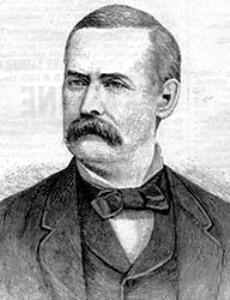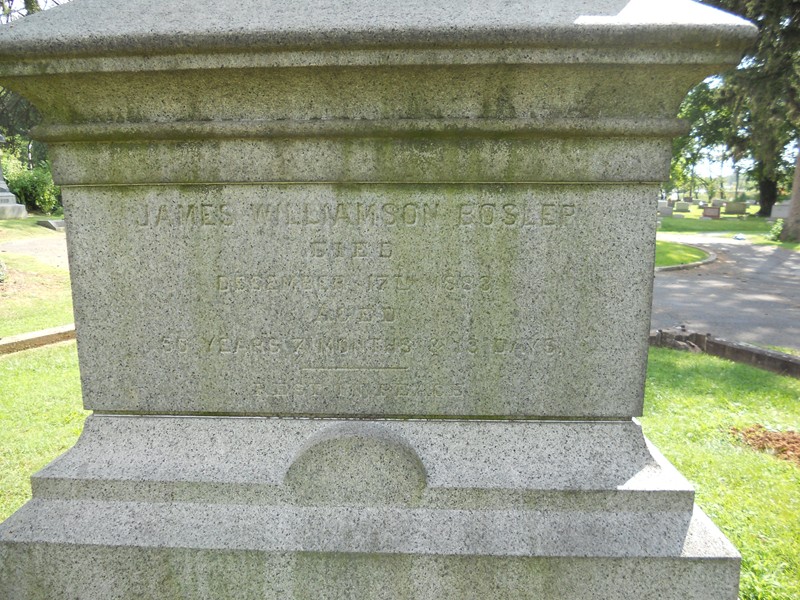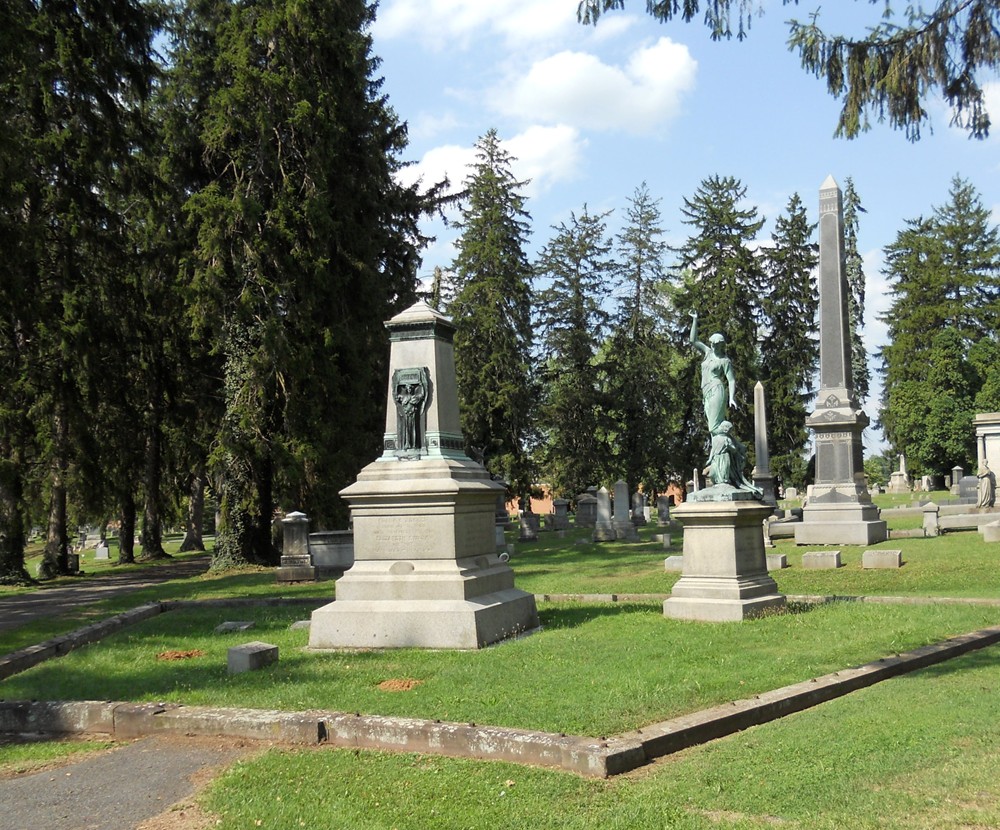Chicago: The Genealogical Publishing Co., 1905, pages 210-217
CUMBERLAND COUNTY. 215
JAMES WILLIAMSON BOSLER was the third son of Abraham and Eliza (Herman) Bosler, and was born on April 4, 1833, near Hogestown, in Silver Spring township, Cumberland county. He was a grandson of John and Catharine (Gish) Bosler, who in 1794 came from Lancaster county and settled in what is now Silver Spring township. He grew up on the farm and received the rudiments of his education in the public school of the neighborhood. Later he attended the Cumberland Academy at New Kingston, and still later took a partial course at Dickinson College. In 1852 he left college and went to Moultrie, Columbiana Co., Ohio, where during the winter of 1853-54 he taught school. From Moultrie he went to Wheeling, Va. (now West Virginia), where he read law and was admitted to the Bar. Although prepared for it, he did not naturally incline toward the practice of the law and instead of entering upon a professional career he for a while clerked in a store in Wheeling, which, coming at the
time it did, was a valuable bit of experience, for it taught him self-reliance and encouraged him to venture into business on his own account. He bought a store in Columbiana county, Ohio, near where he had taught school, laid in a stock of goods and bid for trade. He gave to his mercantile enterprise all his time and attention, but before success had time to wait upon him a disastrous fire wiped out his business and ended his career as a merchant. With the hope of changing his luck he now decided to change his location, and removed to Sioux City, Iowa. The change was advantageous, for it proved to be the beginning of his remarkably successful business career. He formed a partnership with Charles E. Hedges in the real estate business, and later the two established the "Sioux City Bank," under the firm name of Bosler & Hedges. They did a general banking business, and also furnished supplies for the Interior and War Departments of the Government on the North Missouri river. Sioux City was then on the frontier and much of the business of its citizens had connection with government operations. Large numbers of Indians were confined to near-by reservations and these were fed bythe Government under treaty, and to do so vast amounts of supplies were necessary, and Bosler & Hedges, and afterward Mr. Bosler alone, provided a large share of these supplies by contract. The boundless plains just beyond the Missouri river, where erstwhile roamed myriads of buffalo, were blooming into national pasture fields and upon them it was easy and very profitable to raise and fatten cattle. Here was an exceptional opportunity, and James W. Bosler was among the first to recognize and take advantage of it. He became one of the pioneer spirits in the new industry of raising cattle on the Western ranges, invested in it heavily and reaped golden profits by it. Besides being active in real estate, banking and cattle raising, he at times engaged in building operations and by contract erected both the public school building and the jail of Sioux City. He also interested himself in politics and one year was the Democratic nominee for state treasurer of Iowa. He was not elected to this office, but at another time was elected a member of the Iowa State Legislature, and in 1860 was a delegate to the National Democratic Convention, held at Charleston, S. C., where "a distempered individual broke down one of the great parties of the country and made civil war inevitable." Having accumulated a large fortune, he carefully organized his various interests, and in 1866 returned to his native county in Pennsylvania and made
216 CUMBERLAND COUNTY.
arrangements for the domestic peace and comfort of his later years. He built himself a beautiful residence in the suburbs of Carlisle, where, although still continuing his extensive business in the West, he resided until his death. After becoming permanently settled at Carlisle, he became one of the most active and efficient promoters of business enterprises about his home. He helped to organize the Carlisle Manufacturing Company, and was its first president; he was a director in the Carlisle Deposit Bank, a director of the Carlisle Gas & Water Company, and also owned extensive farm interests in different parts of the county. He also was one of the incorporators of the Independent National Bank, of Philadelphia, and a director of it until his death. His active, generous spirit promoted business directly and indirectly, for he not only invested personally but freely and cheerfully extended financial aid to persons who engaged in business, or bought property about him, and never distressed them when adversity came. And when he gave it was with a liberal hand. At the centenary anniversary of Dickinson College, in 1883, at a meeting of the trustees, he subscribed ten thousand dollars for the endowment of a Prof. McClintock chair. He died before this bequest was carried into execution, but after his death his widow, emphasizing her husband's generous motives seven-fold, gave to the institution the splendid "James W. Bosler Memorial Hall," which now stands upon the college campus as a monument to his memory.
Early in his career James W. Bosler was a Democrat, but his associations and business relations during and immediately after the Civil war being largely with influential Republicans, he about that time allied himself with the Republican party. Possessed of wonderful resource and tact, and being a good judge of men, he was very useful to the organization and for years was much sought after in close and doubtful campaigns. He was in close touch with a large number of the most distinguished members of the party and was frequently entrusted with their most important political secrets. He was a warm personal friend of Hon. James G. Blaine, and at the Republican National Convention in 1880 was one of a committee of three-the other two being John Roach, the shipbuilder, and Senator Chaffee, of Colorado-who had charge of Mr. Blaine's interests as a candidate for the Presidency. Mr. Blaine did not upon this occasion receive the nomination, but every time he made a campaign for the Presidency James W. Bosler was his unswerving friend, and not only contributed heavily himself, but made others give up to his measure. For this substantial friendship Mr. Blaine showed due appreciation all through life and when Mr. Bosler's remains were borne to the tomb he was a mourner at the side of his bier. Several years afterward, in writing to Mrs. Bosler, he said: "As the years go by I realize more and more how great was my own loss in the death of your husband, and from that I can realize in some faint degree how inestimable was your affection. He was the dearest and most unselfish of friends, and I keep his memory green in my heart." Although the friend he so loyally championed at the National Convention of 1880 was defeated, Mr. Bosler did not sulk or withhold his support from the nominee. He promptly went to the front and gave proof of the sincerity of his acquiescence by giving liberally to the cause. Through his example other men became equally generous, and to him, as much as to any man in the United States, the election of Gen. Garfield was due. One of the great
CUMBERLAND COUNTY. 217
public men in Pennsylvania that James W. Bosler was on intimate terms with was Benjamin Harris Brewster. He ranked high as a lawyer, had held important public positions and aspired to a cabinet position. In December, 1881, President Arthur appointed Mr. Brewster Attorney-General of the United
States, and since his death extracts from letters written by him have been made public showing that he relied principally upon Mr. Bosler's influence to obtain the appointment to this high office.
In 1882 Mr. Bosler was nominated by the Republicans of the 32d District, composed of the counties of Cumberland and Adams, for State senator. The district then was Democratic by about 1,800, and although he was not elected, Mr. Bosler reduced this large majority to 136. His whole career shows that he cared more for the political success of his friends than he did for his own, and in public affairs he preferred to act through others, yet, had he been elected State senator, there is reason to believe, that, with his great influence and extensive acquaintance with public men and public affairs, the public interests would have been well served.
In 1860 James W. Bosler married Helen Beltzhoover, daughter of Michael G. and Mary (Herman) Beltzhoover, of near Boiling Springs, Cumberland county. Going to the far west they began their married life in Sioux City and lived there for six years. On the completion of their new home at Carlisle they removed to it and there lived the rest of their days. Mr. Bosler's end came suddenly on Monday, Dec. 17, 1883. He, a few days before, had returned from an exhausting business trip and on the afternoon of the day named was in his office, on the beautiful grounds of his residence, when he was stricken down with apoplexy and died before he could be removed to his house. He was in the prime of life, in the floodtide of usefulness, and his unexpected death was a shock to the entire community, and drew the warmest expressions of sympathy from far and near. Messages of regret and condolence came to the bereaved family from Charles B. Lore, James G. Blaine, Stephen B. Elkins, Thomas Beaver, Jacob Tome, Enoch Pratt and others of the same class, and in the immense throng at his funeral a few days afterward were some of the most distinguished men of the land. His wife, Helen (Beltzhoover) Bosler, died on Oct. 5, 1890, and their remains rest side by side in the family plat in Ashland cemetery.
To James W. and Helen (Beltzhoover) Bosler five children were born, viz.: Charles, Frank C., Mary Eliza, DeWitt Clinton and Helen Louisa. Charles died in December, 1870, inn the seventh year of his age. D. Clinton was born April 25, 1873, graduated from Harvard College in 1897, and died Dec. 22, 1903.
Frank C. Bosler was born May 1, 1869, and graduated from Harvard College in the class of 1894, and, being the only son living, it is upon him that chiefly rests the responsibility of caring for the large estate that descended to him and his sisters from his father. He is largely interested in business enterprises and is a director in the Carlisle Deposit Bank, and the Farmers' Trust Company of Carlisle, and is the principal owner in the Iron Mountain Ranch Company of Wyoming. Mary Eliza is the wife of Lewis S. Sadler, Esq., a member of the law firm of Sadler & Sadler, of Carlisle. Frank C. and Helen L. are unmarried, and all of them reside at "Cottage Hill," the beautiful home their father built in the suburbs of Carlisle
218 CUMBERLAND COUNTY.
in 1866. Like the family for generations past they adhere to the Presbyterian faith and are all members of the Second Presbyterian Church of Carlisle.
Chicago: The Genealogical Publishing Co., 1905, pages 210-217
CUMBERLAND COUNTY. 215
JAMES WILLIAMSON BOSLER was the third son of Abraham and Eliza (Herman) Bosler, and was born on April 4, 1833, near Hogestown, in Silver Spring township, Cumberland county. He was a grandson of John and Catharine (Gish) Bosler, who in 1794 came from Lancaster county and settled in what is now Silver Spring township. He grew up on the farm and received the rudiments of his education in the public school of the neighborhood. Later he attended the Cumberland Academy at New Kingston, and still later took a partial course at Dickinson College. In 1852 he left college and went to Moultrie, Columbiana Co., Ohio, where during the winter of 1853-54 he taught school. From Moultrie he went to Wheeling, Va. (now West Virginia), where he read law and was admitted to the Bar. Although prepared for it, he did not naturally incline toward the practice of the law and instead of entering upon a professional career he for a while clerked in a store in Wheeling, which, coming at the
time it did, was a valuable bit of experience, for it taught him self-reliance and encouraged him to venture into business on his own account. He bought a store in Columbiana county, Ohio, near where he had taught school, laid in a stock of goods and bid for trade. He gave to his mercantile enterprise all his time and attention, but before success had time to wait upon him a disastrous fire wiped out his business and ended his career as a merchant. With the hope of changing his luck he now decided to change his location, and removed to Sioux City, Iowa. The change was advantageous, for it proved to be the beginning of his remarkably successful business career. He formed a partnership with Charles E. Hedges in the real estate business, and later the two established the "Sioux City Bank," under the firm name of Bosler & Hedges. They did a general banking business, and also furnished supplies for the Interior and War Departments of the Government on the North Missouri river. Sioux City was then on the frontier and much of the business of its citizens had connection with government operations. Large numbers of Indians were confined to near-by reservations and these were fed bythe Government under treaty, and to do so vast amounts of supplies were necessary, and Bosler & Hedges, and afterward Mr. Bosler alone, provided a large share of these supplies by contract. The boundless plains just beyond the Missouri river, where erstwhile roamed myriads of buffalo, were blooming into national pasture fields and upon them it was easy and very profitable to raise and fatten cattle. Here was an exceptional opportunity, and James W. Bosler was among the first to recognize and take advantage of it. He became one of the pioneer spirits in the new industry of raising cattle on the Western ranges, invested in it heavily and reaped golden profits by it. Besides being active in real estate, banking and cattle raising, he at times engaged in building operations and by contract erected both the public school building and the jail of Sioux City. He also interested himself in politics and one year was the Democratic nominee for state treasurer of Iowa. He was not elected to this office, but at another time was elected a member of the Iowa State Legislature, and in 1860 was a delegate to the National Democratic Convention, held at Charleston, S. C., where "a distempered individual broke down one of the great parties of the country and made civil war inevitable." Having accumulated a large fortune, he carefully organized his various interests, and in 1866 returned to his native county in Pennsylvania and made
216 CUMBERLAND COUNTY.
arrangements for the domestic peace and comfort of his later years. He built himself a beautiful residence in the suburbs of Carlisle, where, although still continuing his extensive business in the West, he resided until his death. After becoming permanently settled at Carlisle, he became one of the most active and efficient promoters of business enterprises about his home. He helped to organize the Carlisle Manufacturing Company, and was its first president; he was a director in the Carlisle Deposit Bank, a director of the Carlisle Gas & Water Company, and also owned extensive farm interests in different parts of the county. He also was one of the incorporators of the Independent National Bank, of Philadelphia, and a director of it until his death. His active, generous spirit promoted business directly and indirectly, for he not only invested personally but freely and cheerfully extended financial aid to persons who engaged in business, or bought property about him, and never distressed them when adversity came. And when he gave it was with a liberal hand. At the centenary anniversary of Dickinson College, in 1883, at a meeting of the trustees, he subscribed ten thousand dollars for the endowment of a Prof. McClintock chair. He died before this bequest was carried into execution, but after his death his widow, emphasizing her husband's generous motives seven-fold, gave to the institution the splendid "James W. Bosler Memorial Hall," which now stands upon the college campus as a monument to his memory.
Early in his career James W. Bosler was a Democrat, but his associations and business relations during and immediately after the Civil war being largely with influential Republicans, he about that time allied himself with the Republican party. Possessed of wonderful resource and tact, and being a good judge of men, he was very useful to the organization and for years was much sought after in close and doubtful campaigns. He was in close touch with a large number of the most distinguished members of the party and was frequently entrusted with their most important political secrets. He was a warm personal friend of Hon. James G. Blaine, and at the Republican National Convention in 1880 was one of a committee of three-the other two being John Roach, the shipbuilder, and Senator Chaffee, of Colorado-who had charge of Mr. Blaine's interests as a candidate for the Presidency. Mr. Blaine did not upon this occasion receive the nomination, but every time he made a campaign for the Presidency James W. Bosler was his unswerving friend, and not only contributed heavily himself, but made others give up to his measure. For this substantial friendship Mr. Blaine showed due appreciation all through life and when Mr. Bosler's remains were borne to the tomb he was a mourner at the side of his bier. Several years afterward, in writing to Mrs. Bosler, he said: "As the years go by I realize more and more how great was my own loss in the death of your husband, and from that I can realize in some faint degree how inestimable was your affection. He was the dearest and most unselfish of friends, and I keep his memory green in my heart." Although the friend he so loyally championed at the National Convention of 1880 was defeated, Mr. Bosler did not sulk or withhold his support from the nominee. He promptly went to the front and gave proof of the sincerity of his acquiescence by giving liberally to the cause. Through his example other men became equally generous, and to him, as much as to any man in the United States, the election of Gen. Garfield was due. One of the great
CUMBERLAND COUNTY. 217
public men in Pennsylvania that James W. Bosler was on intimate terms with was Benjamin Harris Brewster. He ranked high as a lawyer, had held important public positions and aspired to a cabinet position. In December, 1881, President Arthur appointed Mr. Brewster Attorney-General of the United
States, and since his death extracts from letters written by him have been made public showing that he relied principally upon Mr. Bosler's influence to obtain the appointment to this high office.
In 1882 Mr. Bosler was nominated by the Republicans of the 32d District, composed of the counties of Cumberland and Adams, for State senator. The district then was Democratic by about 1,800, and although he was not elected, Mr. Bosler reduced this large majority to 136. His whole career shows that he cared more for the political success of his friends than he did for his own, and in public affairs he preferred to act through others, yet, had he been elected State senator, there is reason to believe, that, with his great influence and extensive acquaintance with public men and public affairs, the public interests would have been well served.
In 1860 James W. Bosler married Helen Beltzhoover, daughter of Michael G. and Mary (Herman) Beltzhoover, of near Boiling Springs, Cumberland county. Going to the far west they began their married life in Sioux City and lived there for six years. On the completion of their new home at Carlisle they removed to it and there lived the rest of their days. Mr. Bosler's end came suddenly on Monday, Dec. 17, 1883. He, a few days before, had returned from an exhausting business trip and on the afternoon of the day named was in his office, on the beautiful grounds of his residence, when he was stricken down with apoplexy and died before he could be removed to his house. He was in the prime of life, in the floodtide of usefulness, and his unexpected death was a shock to the entire community, and drew the warmest expressions of sympathy from far and near. Messages of regret and condolence came to the bereaved family from Charles B. Lore, James G. Blaine, Stephen B. Elkins, Thomas Beaver, Jacob Tome, Enoch Pratt and others of the same class, and in the immense throng at his funeral a few days afterward were some of the most distinguished men of the land. His wife, Helen (Beltzhoover) Bosler, died on Oct. 5, 1890, and their remains rest side by side in the family plat in Ashland cemetery.
To James W. and Helen (Beltzhoover) Bosler five children were born, viz.: Charles, Frank C., Mary Eliza, DeWitt Clinton and Helen Louisa. Charles died in December, 1870, inn the seventh year of his age. D. Clinton was born April 25, 1873, graduated from Harvard College in 1897, and died Dec. 22, 1903.
Frank C. Bosler was born May 1, 1869, and graduated from Harvard College in the class of 1894, and, being the only son living, it is upon him that chiefly rests the responsibility of caring for the large estate that descended to him and his sisters from his father. He is largely interested in business enterprises and is a director in the Carlisle Deposit Bank, and the Farmers' Trust Company of Carlisle, and is the principal owner in the Iron Mountain Ranch Company of Wyoming. Mary Eliza is the wife of Lewis S. Sadler, Esq., a member of the law firm of Sadler & Sadler, of Carlisle. Frank C. and Helen L. are unmarried, and all of them reside at "Cottage Hill," the beautiful home their father built in the suburbs of Carlisle
218 CUMBERLAND COUNTY.
in 1866. Like the family for generations past they adhere to the Presbyterian faith and are all members of the Second Presbyterian Church of Carlisle.
Inscription
50y 7m 13d
Family Members
Advertisement
Advertisement



















